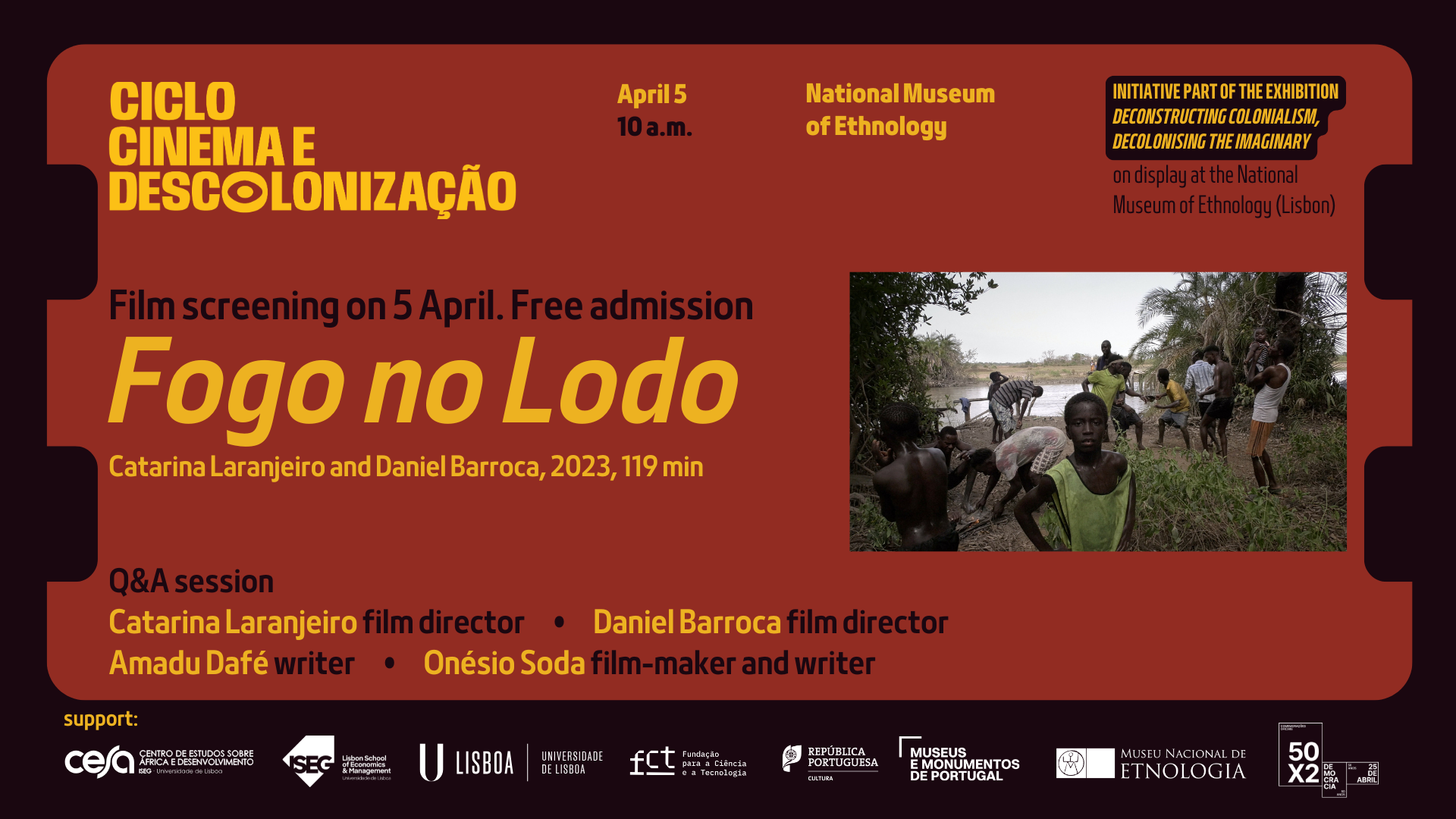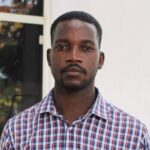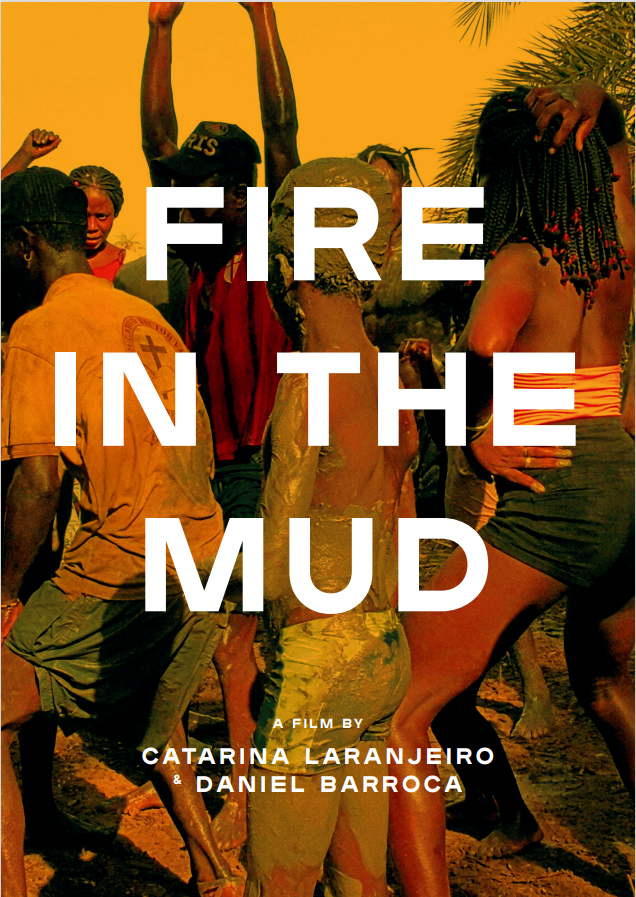April session of the Cinema and Decolonisation Cycle to screen the documentary ‘Fogo no Lodo’ at the National Museum of Ethnology with free admission

The 2024/2025 season of the Cinema and Decolonisation Cycle has been running since November 2024, hosting cineclub-style sessions to explore the legacies and memories of decolonisation. The next session, scheduled for 5 April, will feature a screening of the documentary Fogo no Lodo (“Fire in the Mud”, Catarina Laranjeiro and Daniel Barroca, 2023, Portugal, 119 min), which has received in 2023 the Fundação INATEL Award at the Doclisboa – International Film Festival and in 2024 the Special Jury Award at the Apricot Tree Film Festival — wich is an international festival dedicated to etnographic documentaries, held in Armenia.
The film will be shown at 10:00 a.m. in the Auditorium of the National Museum of Ethnology (Avenida Ilha da Madeira Lisbon 1400-204), with free admission and subtitles in Portuguese. Following the film screening, a Q&A session will take place with the participation of the film directors, Catarina Laranjeiro and Daniel Barroca, as well as invited guests, namely the Guinean writer Amadu Dafé and the Guinean filmmaker and writer Onésio Soda.
Synopsis – Fogo no Lodo (“Fire in the Mud”, Catarina Laranjeiro and Daniel Barroca, 2023, Portugal, 119 min)
Unal is a village of rice producers whose inhabitants played a crucial role in Guinea-Bissau’s liberation struggle against Portuguese colonialism. They were the first to engage in the armed uprising, mobilizing their ancestral spirits, the Irãs – the natural land-owners to whom they pay reverence – into the guerilla. Still today, every gesture of the rice cycle – from plowing to harvesting – is haunted by memories of the war. A trauma that is also inscribed in their present day rituals, bodies, landscapes, and techno music.
In the war’s aftermath, a group of soldiers got possessed by a messianic vision, “The Shadow”, that gave them the power to foresee the future and heal their communities with bush plants through
talismanic writings. “Fire in the Mud” takes a deeply immersive approach to a complex melting pot of religious forms and political turmoil within a diverse community claiming their future in contemporary Guinea-Bissau.
Credits
Directed by: Catarina Laranjeiro and Daniel Barroca
Assistant Directors: Mamassaliu Na M’Baatcha (Sada) and Julio Na M’Baatcha
Image and editing: Daniel Barroca
Sound engineer, sound designer and sound mixer: Dídio Pestana
Color grading: Gonçalo Ferreira
Graphic Design: Rui Silva
Executive Producer: Catarina Laranjeiro
Producers: Rui Ribeiro, Elsa Sertório and Ansgar Schaefer
Production Manager at Guinea-Bissau: Queba Quebi
Awards
[2023] Prémio Fundação INATEL, DocLisboa – Festival Internacional de Cinema
[2024] Special Jury Award, Apricot Tree Film Festival
Check out the Film Sheet
Get to know the discussants:
 Catarina Laranjeiro is a researcher at the Institute of Contemporary History at NOVA FCSH, where she develops research on vernacular cinema in Cape Verde and Guinea-Bissau and their respective diasporas in Portugal and France. She holds a PhD in Post-Colonialism and Global Citizenship from the Centre for Social Studies at the University of Coimbra and an MA in Visual and Media Anthropology from the Freie Universitaet Berlin. She regularly participates in various projects and collectives that cross anthropology, photography and cinema. She directed the film Pabia di Aos (2013) and co-directed, with Daniel Barroca, the film Fogo no Lodo (2022).
Catarina Laranjeiro is a researcher at the Institute of Contemporary History at NOVA FCSH, where she develops research on vernacular cinema in Cape Verde and Guinea-Bissau and their respective diasporas in Portugal and France. She holds a PhD in Post-Colonialism and Global Citizenship from the Centre for Social Studies at the University of Coimbra and an MA in Visual and Media Anthropology from the Freie Universitaet Berlin. She regularly participates in various projects and collectives that cross anthropology, photography and cinema. She directed the film Pabia di Aos (2013) and co-directed, with Daniel Barroca, the film Fogo no Lodo (2022).
 Daniel Barroca is a visual artist working with audiovisual and interdisciplinary formats. He has undertaken residencies at the Spanish Academy in Rome (2003–2004), Künstlerhaus Bethanien in Berlin (2007), QBox Gallery in Athens (2009), Rijksakademie van Beeldende Kunsten in Amsterdam (2010–2011), Home Workspace Programme at Ashkal Alwan in Beirut (2013–2014), and Open Sessions at The Drawing Center in New York (2014–2015). His work includes expanded cinema installations, which have been exhibited in various national and international venues over the years. In 2018, he completed a master’s degree in Anthropology at the University of Florida, Gainesville, as part of his broader research on the creation of immaterial images during the Colonial War. He is currently pursuing a PhD in Anthropology at the Institute of Social Sciences, University of Lisbon (ICS).
Daniel Barroca is a visual artist working with audiovisual and interdisciplinary formats. He has undertaken residencies at the Spanish Academy in Rome (2003–2004), Künstlerhaus Bethanien in Berlin (2007), QBox Gallery in Athens (2009), Rijksakademie van Beeldende Kunsten in Amsterdam (2010–2011), Home Workspace Programme at Ashkal Alwan in Beirut (2013–2014), and Open Sessions at The Drawing Center in New York (2014–2015). His work includes expanded cinema installations, which have been exhibited in various national and international venues over the years. In 2018, he completed a master’s degree in Anthropology at the University of Florida, Gainesville, as part of his broader research on the creation of immaterial images during the Colonial War. He is currently pursuing a PhD in Anthropology at the Institute of Social Sciences, University of Lisbon (ICS).
 Amadu Dafé was born in Ingoré, Guinea-Bissau, and has been living in Portugal for over twelve years, where he studied Law and Public Employment Law at the Faculty of Law, University of Lisbon. He also holds a degree in Accounting from the National School of Administration in Guinea-Bissau. He is the presenter of Mar de Letras, one of the longest-running and most prestigious programmes on RTP’s Africa channel. He is a co-founder of the Casa da Cultura da Guiné-Bissau in Lisbon and a full member of both the Association of Writers of Guinea-Bissau and PEN Guinea-Bissau. In 2021, he edited and organised the reissue of Florbela Espanca – Alma Sonhadora Irmã Gémea de Fernando Pessoa, published by Manufactura Editora, which won Bertrand’s 2021 Book of the Year Award in the reissue category. He is the author of several works, including A Selva Mágica das Sarnadas de Ródão (2023, Editorial Novembro), A Cidade que Tudo Devorou (2022, Nimba Edições), Jasmim (2020, Manufactura Editora, translated into German), Ussu de Bissau (2019, Manufactura Editora, finalist for the 2021 Eça de Queiroz and BCP Literary Prize), and Magarias (2017, Esfera do Caos–Editores). He co-authored Fora de Jogo (2019), a short story collection commemorating the 25th anniversary of KuSiMon Publishing, which was translated into Spanish. Among other distinctions, he has twice won the José Carlos Schwarz Literary Prize (2015 and 2017) and the Matilde Rosa Araújo International Children’s Story Prize (2012).
Amadu Dafé was born in Ingoré, Guinea-Bissau, and has been living in Portugal for over twelve years, where he studied Law and Public Employment Law at the Faculty of Law, University of Lisbon. He also holds a degree in Accounting from the National School of Administration in Guinea-Bissau. He is the presenter of Mar de Letras, one of the longest-running and most prestigious programmes on RTP’s Africa channel. He is a co-founder of the Casa da Cultura da Guiné-Bissau in Lisbon and a full member of both the Association of Writers of Guinea-Bissau and PEN Guinea-Bissau. In 2021, he edited and organised the reissue of Florbela Espanca – Alma Sonhadora Irmã Gémea de Fernando Pessoa, published by Manufactura Editora, which won Bertrand’s 2021 Book of the Year Award in the reissue category. He is the author of several works, including A Selva Mágica das Sarnadas de Ródão (2023, Editorial Novembro), A Cidade que Tudo Devorou (2022, Nimba Edições), Jasmim (2020, Manufactura Editora, translated into German), Ussu de Bissau (2019, Manufactura Editora, finalist for the 2021 Eça de Queiroz and BCP Literary Prize), and Magarias (2017, Esfera do Caos–Editores). He co-authored Fora de Jogo (2019), a short story collection commemorating the 25th anniversary of KuSiMon Publishing, which was translated into Spanish. Among other distinctions, he has twice won the José Carlos Schwarz Literary Prize (2015 and 2017) and the Matilde Rosa Araújo International Children’s Story Prize (2012).
 Onésio Soda, pseudonym UNKAFF, is a Guinean filmmaker, writer, sociologist, and military officer, currently a master’s candidate in Development Studies at ISTEC-IUL. He is a co-founder and member of the Kabaz Kultural Association and a member of the Commission for the Collection of Historical Data on the National Liberation Struggle at the General Staff of the Armed Forces of Guinea-Bissau. He is also the mentor of the Nô Ambiente, Nô Mamê project. His works include the short films Vozes de Mar (2019) and Lágrimas de SIDA (2020), the essay A Luta na Guiné: da luta pacífica à luta armada (2020), the article O papel do Museu Militar da Luta de Libertação Nacional na formação da Consciência Histórica Guineense (2021), and the essay A pequena Guiné e a sua grande história (2022).
Onésio Soda, pseudonym UNKAFF, is a Guinean filmmaker, writer, sociologist, and military officer, currently a master’s candidate in Development Studies at ISTEC-IUL. He is a co-founder and member of the Kabaz Kultural Association and a member of the Commission for the Collection of Historical Data on the National Liberation Struggle at the General Staff of the Armed Forces of Guinea-Bissau. He is also the mentor of the Nô Ambiente, Nô Mamê project. His works include the short films Vozes de Mar (2019) and Lágrimas de SIDA (2020), the essay A Luta na Guiné: da luta pacífica à luta armada (2020), the article O papel do Museu Militar da Luta de Libertação Nacional na formação da Consciência Histórica Guineense (2021), and the essay A pequena Guiné e a sua grande história (2022).
About the Cinema and Decolonisation Cycle
The sessions of the Cinema and Decolonisation Cycle will continue until June 2025, with screenings taking place in Auditorium 2 at ISEG (with the exception of the 5 April, which will be held at the National Museum of Ethnology). This initiative runs parallel to the exhibition Deconstructing Colonialism, Decolonising the Imagination, on display at the National Museum of Ethnology until 2 November.
Check out the programme below:
Decolonisation must be understood as an ongoing process, one that needs to be embraced and integrated into social, political, cultural, and personal dynamics. The project aims to create an open, dynamic space for sharing memories, narratives, dialogues, and reflections. It is coordinated by researcher Jessica Falconi (CEsA/ISEG/ULisboa) and curated by researcher and filmmaker Isabel Noronha (CEsA/ISEG/ULisboa) and filmmaker Camilo de Sousa.
Coordination: Jessica Falconi (CEsA/ISEG/ULisboa)
Curation: Isabel Noronha (CEsA/ISEG/ULisboa) and Camilo de Sousa
Scientific Consulting: Isabel Castro Henriques (CEsA/ISEG/ULisboa), Joana Pereira Leite (CEsA/ISEG/ULisboa), and Ana Mafalda Leite (CEsA/ISEG/ULisboa)
Collaboration: Luca Fazzini and João Moreira Silva
Support: CEsA/ISEG/ULisboa
Read more:
Fogo no Lodo (“Fire in the Mud”) – Kintop website
Ciclo de Cinema e Descolonização | Projeção do Filme “Fogo no Lodo” – ISEG website
Fogo no Lodo (“Fire in the Mud”) – Trailer on YouTube
Programme for the 2024/2025 season of the Cinema and Decolonisation Cycle, in parallel with the exhibition ‘Deconstructing Colonialism, Decolonizing the Imagination’
Author: CEsA Communication Team (comunicacao@cesa.iseg.ulisboa.pt)
Image: Reproduction/Kintop







